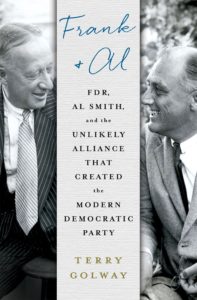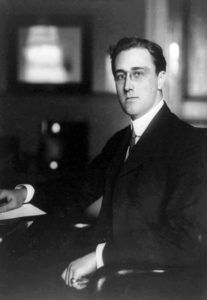WCAG Heading
by Terry Golway
Like many state senators in the spring of 1912, Franklin Roosevelt was a busy man. The Triangle fire and the work of the Factory Investigating Commission had transformed the debates in Albany and inspired legislation and regulations that historians would later celebrate as milestones of progressive thought. In the byzantine corridors of the capitol, beefy men from the city like Big Tim Sullivan and Thomas McManus, Roosevelt’s colleagues in the state senate, proceeded to their offices with a new urgency, for there were bills to pass and causes to adopt and constituents to satisfy—constituents who were making it clear that times had changed and they wanted more than a friendly ear in the clubhouse and a chance to line up for free shoes for their children.
But Franklin Roosevelt’s crowded schedule in the spring of 1912 had little to do with Albany’s new agenda. In fact, the earnest lobbying for new social welfare and labor laws was becoming downright tiresome. As lawmakers were beginning to pass the bills Smith and Wagner wrote, Frances Perkins seized on the momentum to get her fifty-four-hour bill passed. It was a critical piece of the reformers’ agenda, and, she reckoned, the practical politicians could no longer run away and hide from the issue just because a few factory owners objected. She was right: lawmakers like Sullivan and McManus and other roughnecks, as she called them with increasing affection, were lining up in support of the bill.
 The bill was a natural, she figured, for Franklin Roosevelt. She saw him one day as he was preparing to leave the senate chamber, tall and handsome and utterly unapproachable. She approached him anyway. As other senators brushed by, Perkins raised her eyes to Roosevelt’s and told him about the fifty-four-hour bill, explaining how it would improve the lives of working women and would help, in some small way, to ease the exploitation of industrial workers.
The bill was a natural, she figured, for Franklin Roosevelt. She saw him one day as he was preparing to leave the senate chamber, tall and handsome and utterly unapproachable. She approached him anyway. As other senators brushed by, Perkins raised her eyes to Roosevelt’s and told him about the fifty-four-hour bill, explaining how it would improve the lives of working women and would help, in some small way, to ease the exploitation of industrial workers.
The young senator did not attempt to disguise his utter lack of interest. “No, no,” he said as he waved her way. “More important things. Can’t do it now. Can’t do it now. Much more important things.” He rushed away, head in the air, leaving Frances Perkins to wonder how this man Roosevelt could be so “absurd”—a favorite word of hers.
Roosevelt did indeed have many other things to keep him busy as Smith and his allies devoted themselves to the concerns of working men, women, and children. He had formed a new law partnership with a fellow Groton and Harvard graduate, Langdon Marvin, and another lawyer, Harry Hooker, within weeks of being sworn in as a state senator, and Marvin was making it clear that he expected business to boom thanks to Roosevelt’s connections in Albany. “We want more business and big business,” Marvin wrote, underlining the words “business” and “big business,” just in case FDR didn’t get the point. “Keep this in mind and watch for legislative committee work, etc. We can investigate anything the State thinks needs looking into.”
The state, in the form of the Factory Investigating Commission, was looking into a good many things in the spring of 1912, but it did not require the assistance of Marvin, Hooker & Roosevelt, Counsellors at Law.
Edward Litchfield, on the other hand, did.
Edward Litchfield was a fabulously wealthy New Yorker reared in a mansion off Prospect Park in Brooklyn. He fell in love with the castles he saw during a childhood trip to Germany and was now in the process of building himself a palace of his own in the tiny village of Tupper Lake in the Adirondack Mountains near Lake Placid. It would have a hundred rooms, each with a custom ceiling. There would be dozens of fireplaces and a veranda measuring seven hundred feet. A special trophy room, with a thirty-five-foot ceiling designed by Louis Tiffany, would show off his collection of art and furniture. The driveway from the gate of the estate to the chateau itself would be five miles.
It all sounded quite lovely. There was, however, a problem, which is why Litchfield presented himself to the offices of Marvin, Hooker & Roosevelt at 52 Wall Street one day in early 1912. He wanted a road built between Tupper Lake, home to his dream castle, and Long Lake, a nearby town. He expected the state to build it, and to achieve that goal he expected Marvin, Hooker & Roosevelt to make the necessary arrangements. He gave Marvin a blueprint of the planned road and, in essence, told him to make it happen. There would be more business for the firm, he promised.
Marvin immediately sensed the possibilities. This wasn’t just business, this was big business. He began a yearlong correspondence with Roosevelt about getting Litchfield’s road built. Legislation to fund the road already was in the works in both the assembly and senate, but Litchfield needed somebody to make sure it passed. Marvin wrote to Roosevelt, “He is very anxious indeed to have this bill go through. Will you, therefore, see what can be done to advance this bill?”
Through the remainder of the 1912 legislative session and beyond, Roosevelt made the case for Litchfield’s road to colleagues with more power and influence. Roosevelt reported that “through a good deal of diplomacy” he had succeeded in getting the necessary legislation reported out of the senate’s Finance Committee, a crucial step forward for Litchfield’s road. “I do not believe that there will be more trouble passing it,” FDR said with the confidence of a freshman legislator new to the intrigues of Albany. Marvin remained nervous about satisfying the firm’s wealthy client. He told FDR, “I want … every effort made to get this bill pushed now before the opposition becomes … acute.”
The fight for the Litchfield road bill was a classic case of a private interest seeking to benefit from the expenditure of public money, and as Roosevelt himself pointed out, it was hardly the only one of its kind. But Franklin Roosevelt had run for election and, in 1912, was running for reelection as a progressive politician in debt to no boss, no special interest.
In the end, Litchfield did not get his bill. Roosevelt was informed in February 1913—as the state legislature was passing bill after bill upon the recommendation of the Factory Investigating Commission—that any new funding for roads had to be used for roads designated in a state bond issue, and the Litchfield road was not among them.
As Roosevelt reported this bad news to Marvin, he was just about done with Albany, and Albany was just about done with him. He was hoping to land a job with the new administration of Woodrow Wilson, who won the presidency in 1912 over two Republicans, incumbent William Howard Taft and Roosevelt’s cousin Theodore, who finished in second place running on the Progressive Party line.

Franklin had his eye on cousin Teddy’s old job as assistant secretary of the navy. The offer came on the very day that Wilson was inaugurated as president, March 4, 1913, and when Roosevelt returned to Albany after attending the inauguration, he felt obliged to ask for the advice of his legislative leader, Robert Wagner. Should he take the job?
Wagner never hesitated.
“Go, Franklin, go,” Wagner replied. “I’m sure you’ll be a big success down there.” The taciturn German immigrant no doubt tried his best to contain his relief.
He was in Washington days later, sworn into office on March 17, the eighth anniversary of his marriage to Eleanor. Cousin Ted dropped him a note of congratulations. “It is interesting to see that you are in another place which I myself once held,” he wrote.
He was glad to be away from Albany, away from men like Tammany’s Murphy, whom he compared to a “noxious weed.” But, oddly, he also wanted to make sure that he was remembered there for the right reasons. He had kept his distance from the social legislation that was making New York a leader in a new kind of progressivism, but he did agree to sponsor a bill requiring employers to give their workers a day off every seven days. Practically speaking, it guaranteed a day of rest on Sunday.
The bill had the support of Christian clergymen in his district who otherwise had little to say about the new social legislation, so their approval may have had something to do with Roosevelt’s interest. Whatever the case, just a few weeks before he headed to Washington, he made a point of writing to the Factory Investigating Commission’s lead attorney, Abram Elkus. “I hope you are not going to forget my small contribution to this legislature, the so-called One Day Rest in Seven bill,” he wrote. Perhaps sensing, at last, the historic work of the Factory Investigating Commission, Roosevelt wished to note that he was on the right side of history, that he was at the ramparts when the status quo was overthrown. In later years, he would concoct a story that placed him at the center of change in Albany, an audacious claim that few would bother to check.
But people like Abram Elkus and his colleagues knew who was carrying on with the hard work of reform, and it wasn’t Franklin Roosevelt. It was Al Smith.
TERRY GOLWAY is a senior editor at POLITICO and the author of several works of history, including Frank and Al and Machine Made. He has been a columnist and city editor at the New York Observer, a member of the editorial board of the New York Times, and a columnist for the Irish Echo. He holds a Ph.D. in U.S. History from Rutgers University and has taught at the New School, New York University, and Kean University.